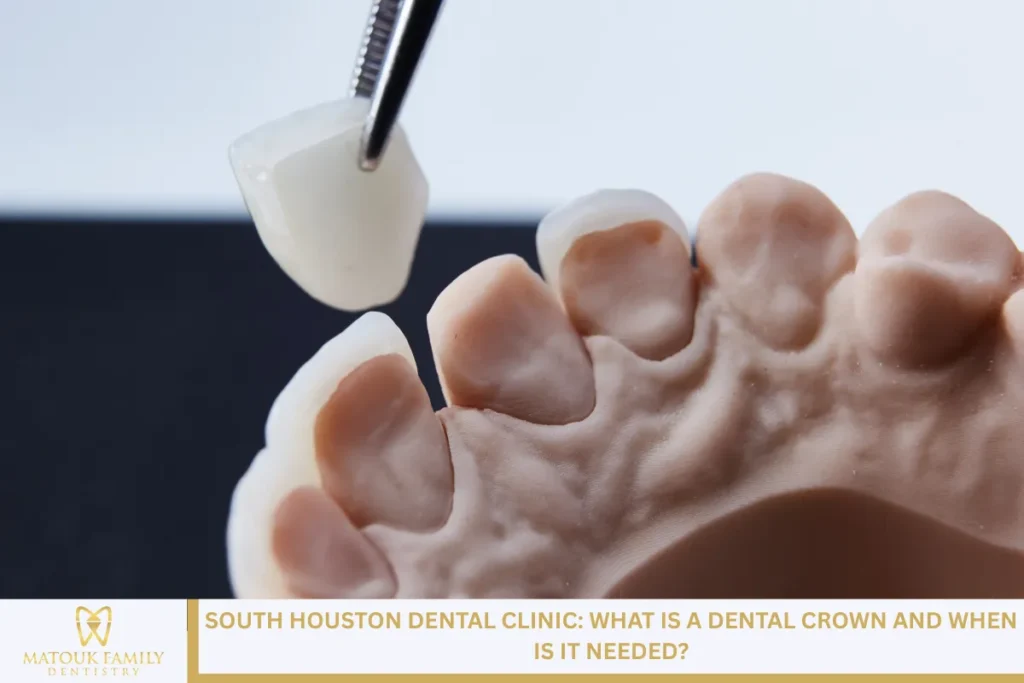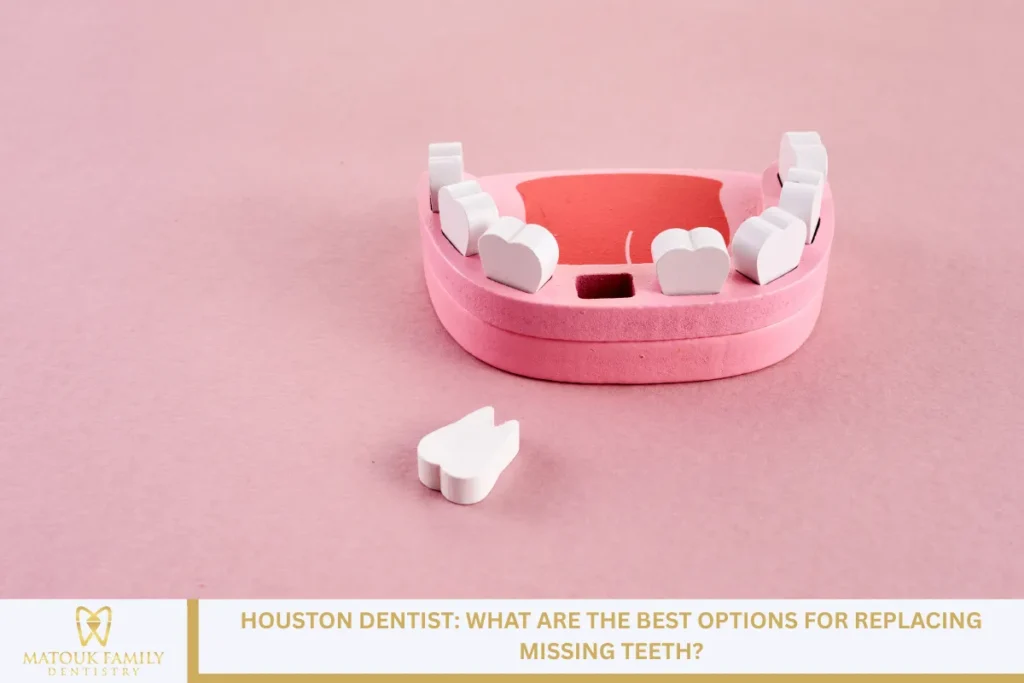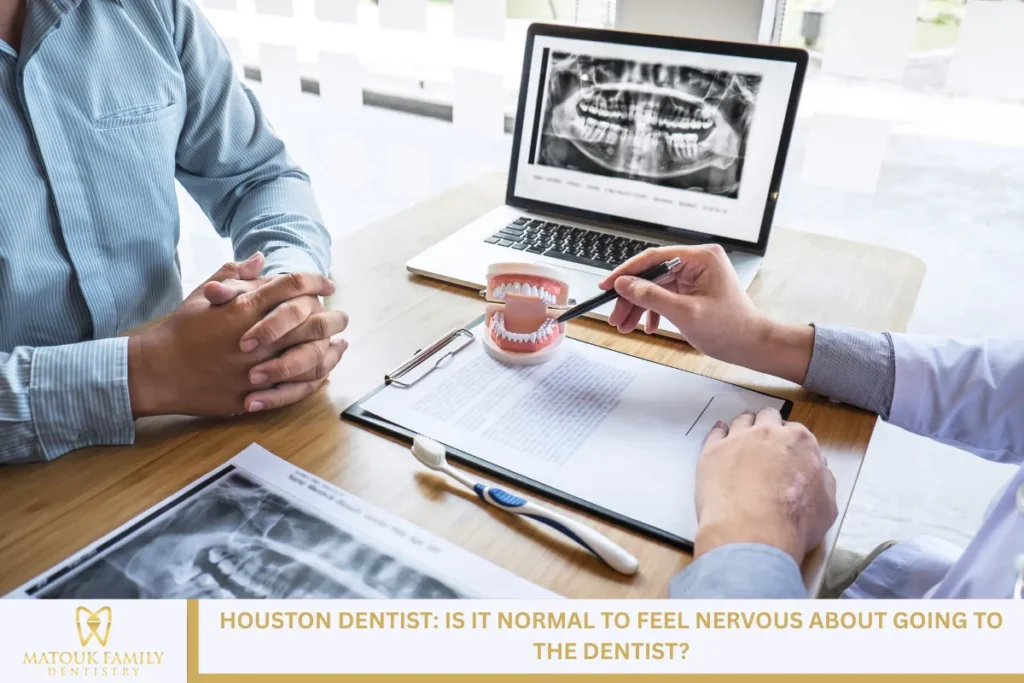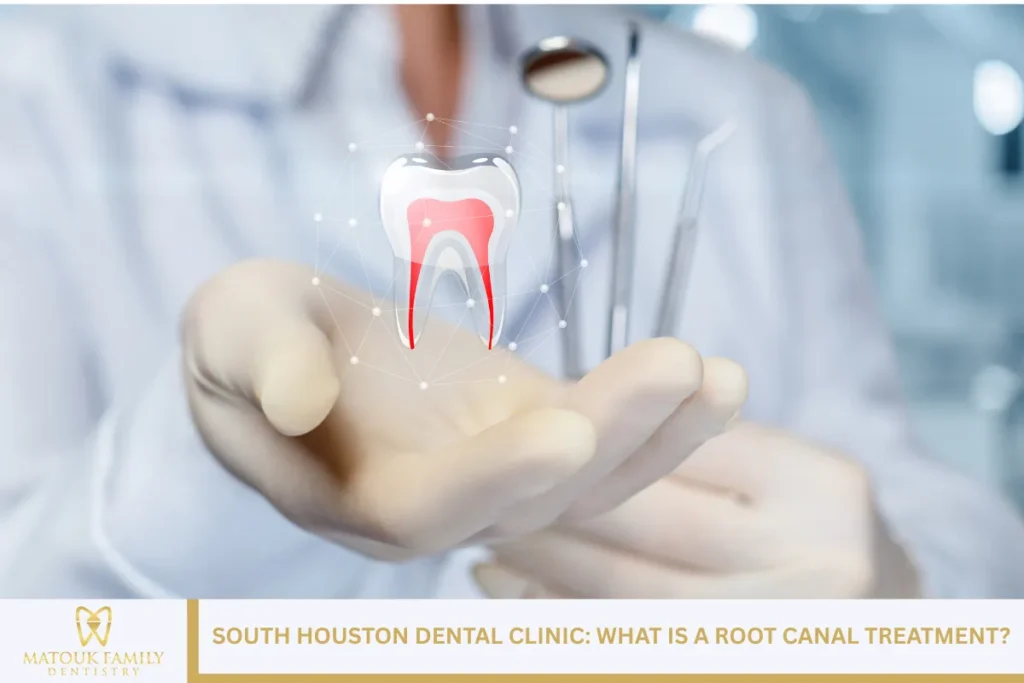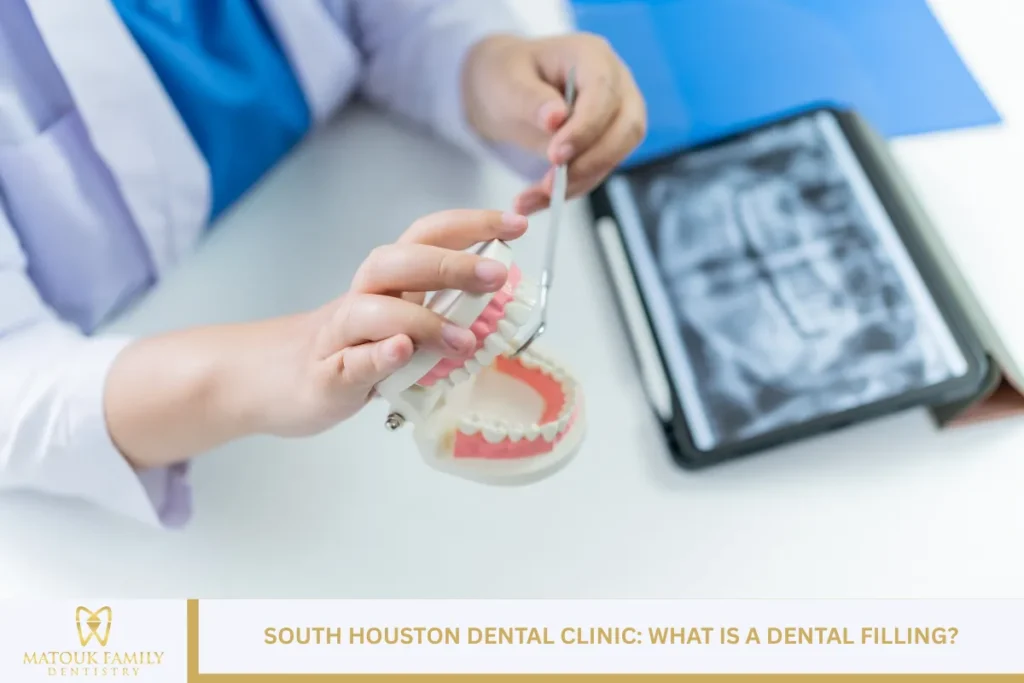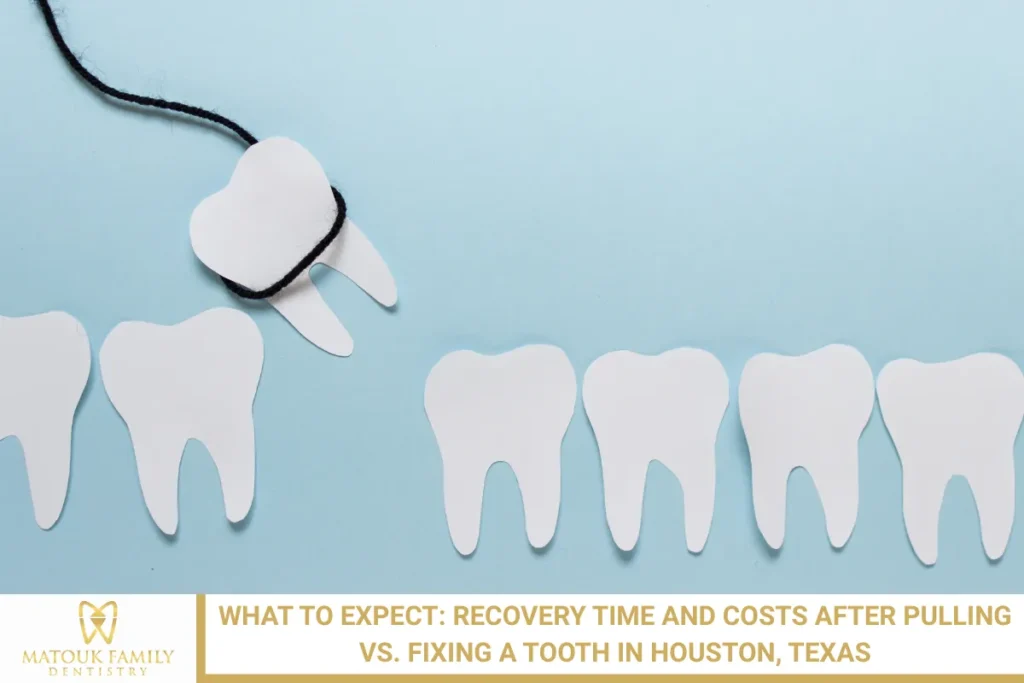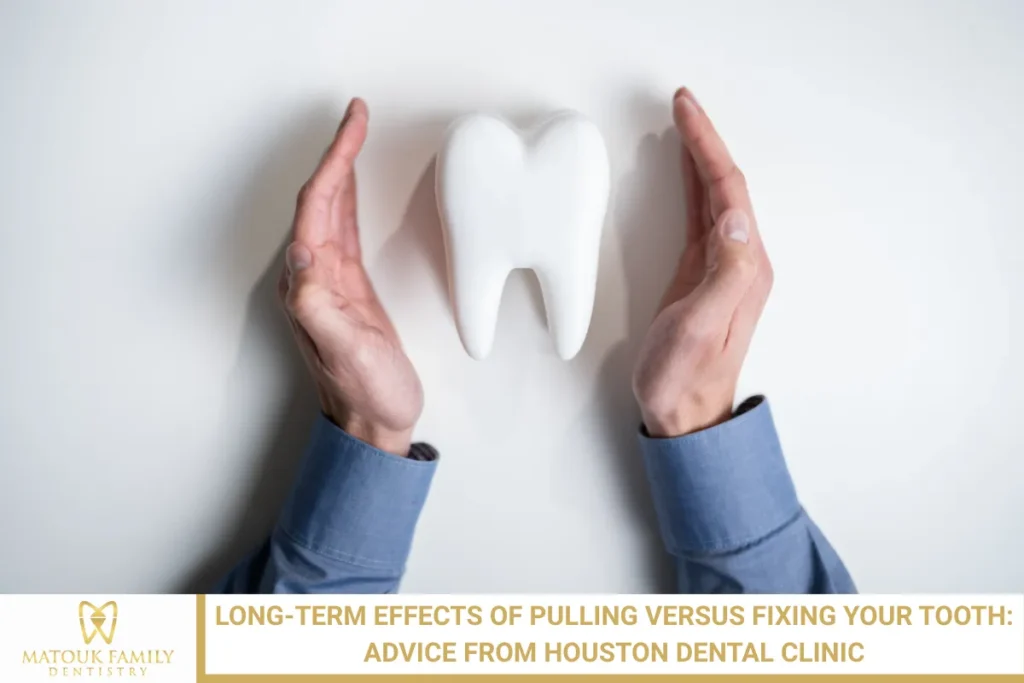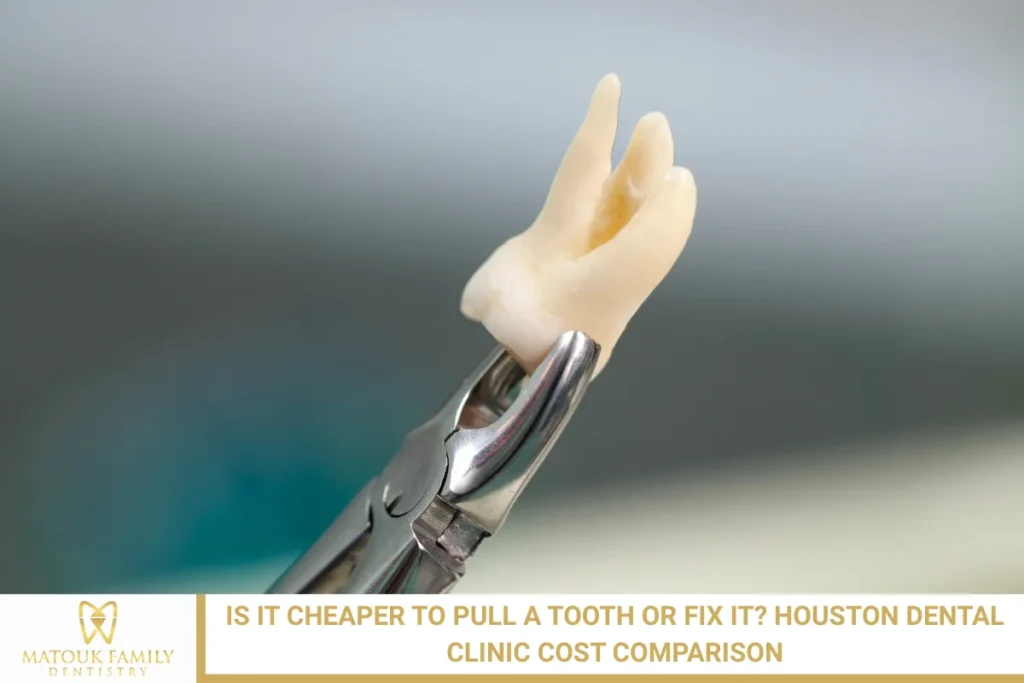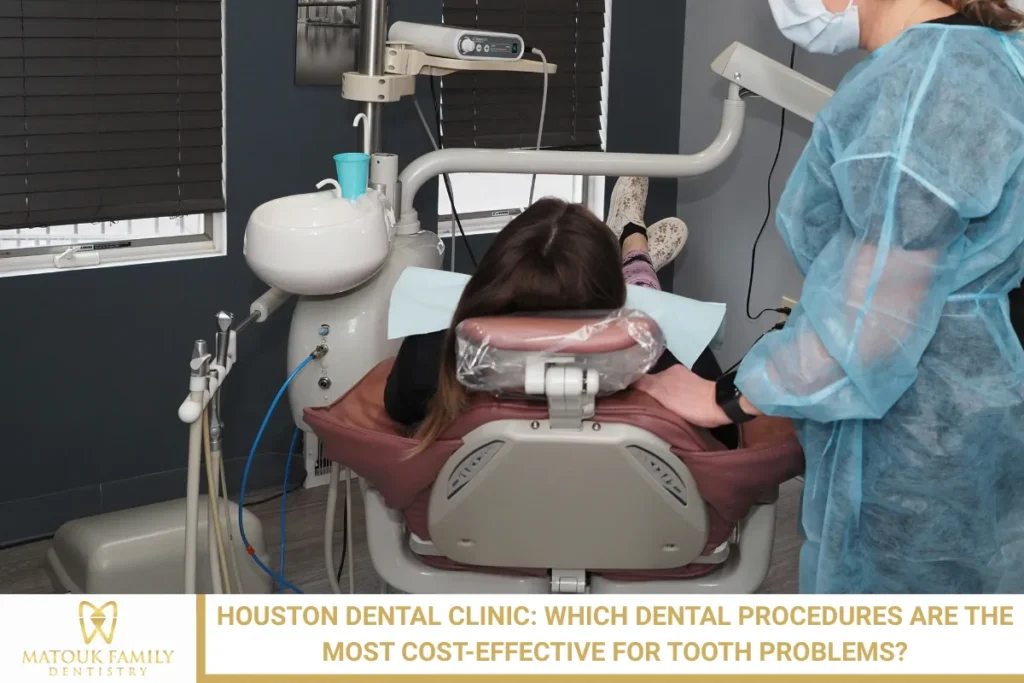A Closer Look at Dental Crowns in South Houston
Choosing the right solution for dental issues like decay, cracks, or structural damage can be overwhelming without the right information. Visiting a dental clinic often results in a common recommendation for these problems—a dental crown. This treatment isn’t just about covering up damage; it’s a proven method to restore the strength, shape, and natural appearance of a compromised tooth.
In South Houston, dental crowns are a frequently used option because they offer both durability and lasting results. When a tooth becomes weakened or severely worn, a crown provides the support it needs to function properly again. This article provides a closer look at what dental crowns are, when they’re necessary, how the process works, and why they remain a trusted solution in general dentistry.
What is a Dental Crown? An In-Depth Explanation
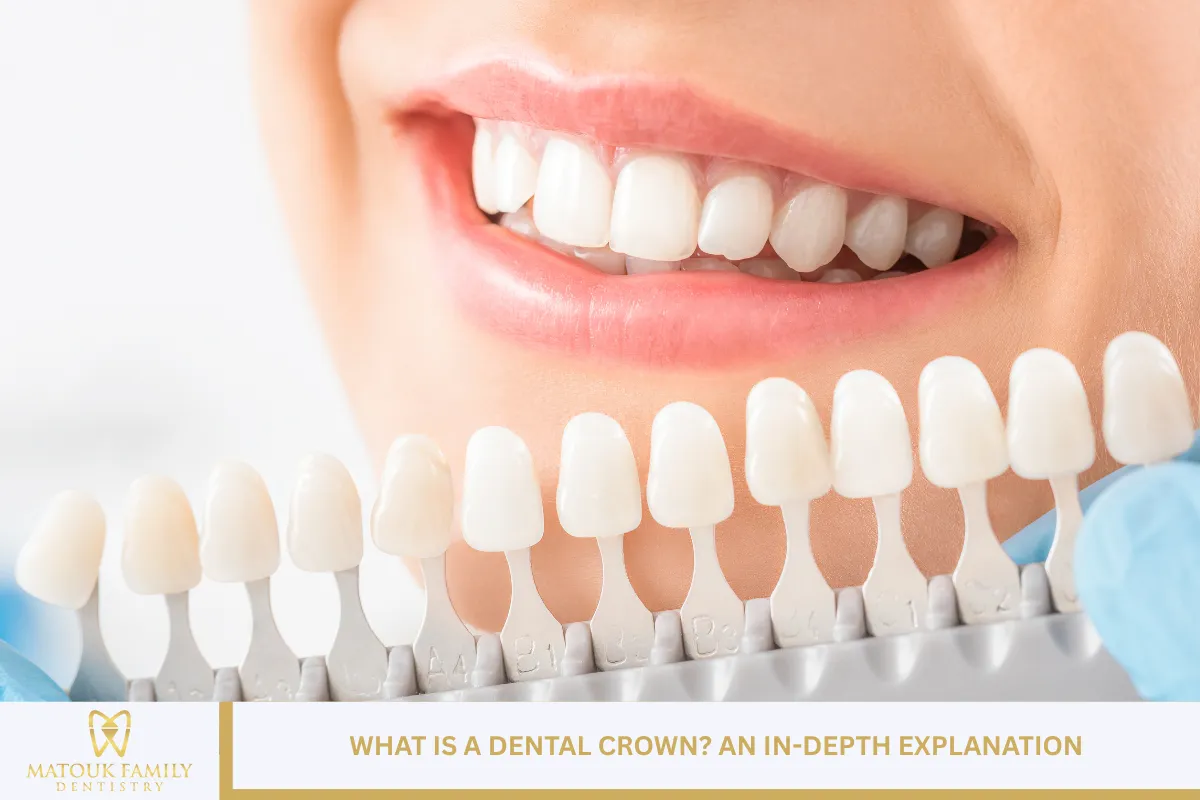
A dental crown is a custom-made covering that encases the visible part of a tooth. It’s designed to replicate the size, shape, strength, and appearance of a natural tooth. Once placed, it becomes the tooth’s new outer surface, providing protection while maintaining functionality.
The process involves removing a portion of the original tooth to make space for the crown. Once the crown is cemented in place, it functions just like a regular tooth—supporting chewing, maintaining proper alignment with other teeth, and enhancing the appearance. Crowns are considered permanent fixtures, although they may need replacement after many years of wear.
Crowns are used on both front and back teeth, with materials chosen based on the placement, function, and aesthetics of each tooth. The goal is always to preserve the natural tooth structure whenever possible and extend the tooth’s lifespan through protective coverage.
Materials Used in Dental Crowns and Their Benefits
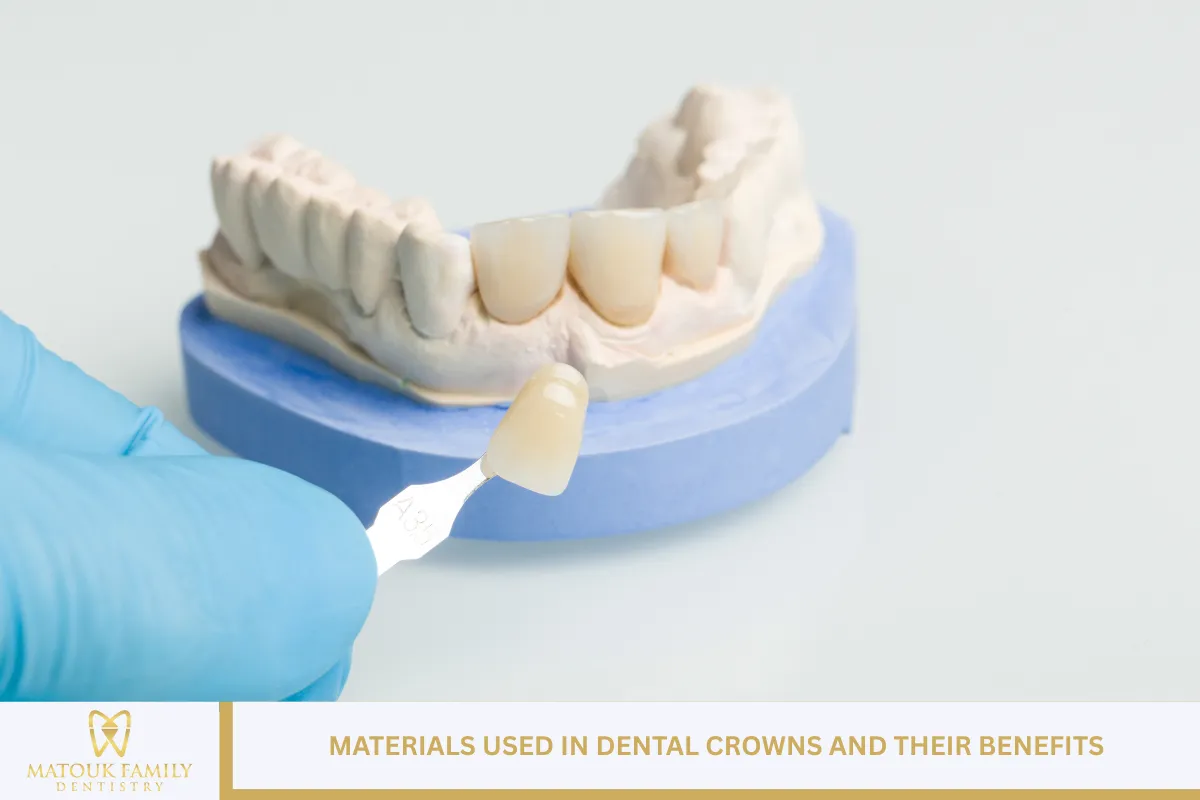
There are several types of dental crown materials, each offering distinct advantages. Choosing the right one depends on factors like location in the mouth, patient preference, and cost.
Porcelain Crowns
Porcelain crowns are highly favored for their natural look. They closely mimic the color and translucency of real teeth, making them ideal for front teeth. While aesthetically pleasing, porcelain crowns can be more fragile than other types, particularly when used on molars.
Porcelain-Fused-to-Metal (PFM) Crowns
These crowns combine the beauty of porcelain with the strength of a metal base. They offer good durability and are typically used for both front and back teeth. However, the metal underneath can sometimes become visible as a dark line near the gums.
All-Ceramic or All-Porcelain Crowns
These crowns offer excellent cosmetic results and are metal-free, a benefit for individuals with metal sensitivities. They are a common choice for visible teeth and offer a good balance between appearance and strength.
Gold and Metal Alloy Crowns
Gold crowns and those made from other metal alloys are extremely durable and ideal for molars, where chewing pressure is strongest. While they are not visually discreet, their longevity makes them a preferred option for use in the back teeth.
Resin Crowns
Resin crowns are generally less expensive than other types of crowns. They are easier to produce but more prone to wear and fractures. They are sometimes used as temporary solutions while waiting for a permanent crown to be fitted.
Reasons a Dental Crown May Be Needed
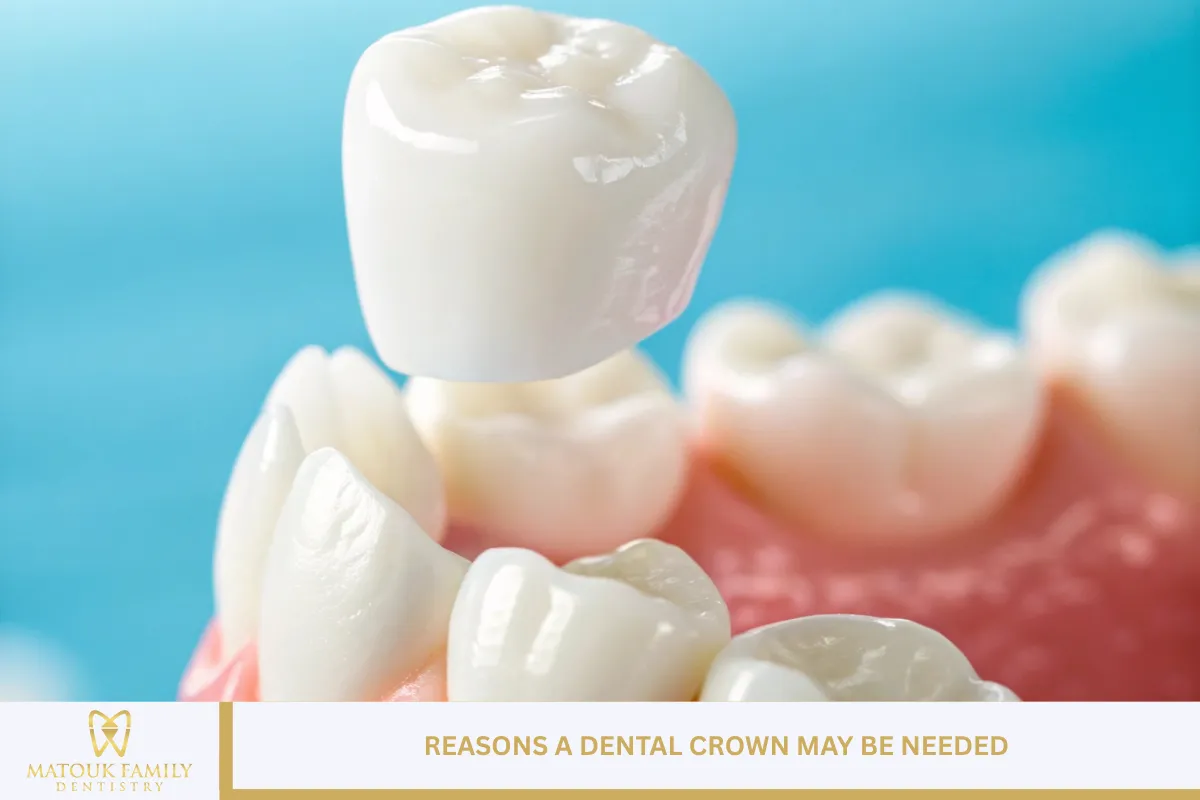
Dental crowns serve both functional and cosmetic purposes. They are not limited to any one type of dental issue. They are often used in several scenarios to either save a tooth or improve its performance and appearance.
To Restore a Broken or Severely Worn Tooth
When a tooth has been chipped, cracked, or worn down due to grinding or general use, a crown can cover and protect it, restoring its shape and function.
To Strengthen a Tooth After a Large Filling
A tooth with a large filling may not have enough structure left to remain stable. In these cases, a crown acts as reinforcement, protecting the remaining natural tooth from breaking.
To Protect a Tooth After a Root Canal
Teeth that have undergone root canal therapy are often more brittle and susceptible to fractures. Crowns are almost always placed on such teeth to preserve their function and appearance.
To Support a Dental Bridge
Crowns are used on either side of a dental bridge to secure it in place. These supporting crowns are essential for the bridge to function properly and stay in place.
For Cosmetic Improvement
Crowns are sometimes used to improve the look of misshapen or severely discolored teeth, especially when other treatments like whitening or veneers aren’t suitable.
The Dental Crown Procedure: Step-by-Step Guide
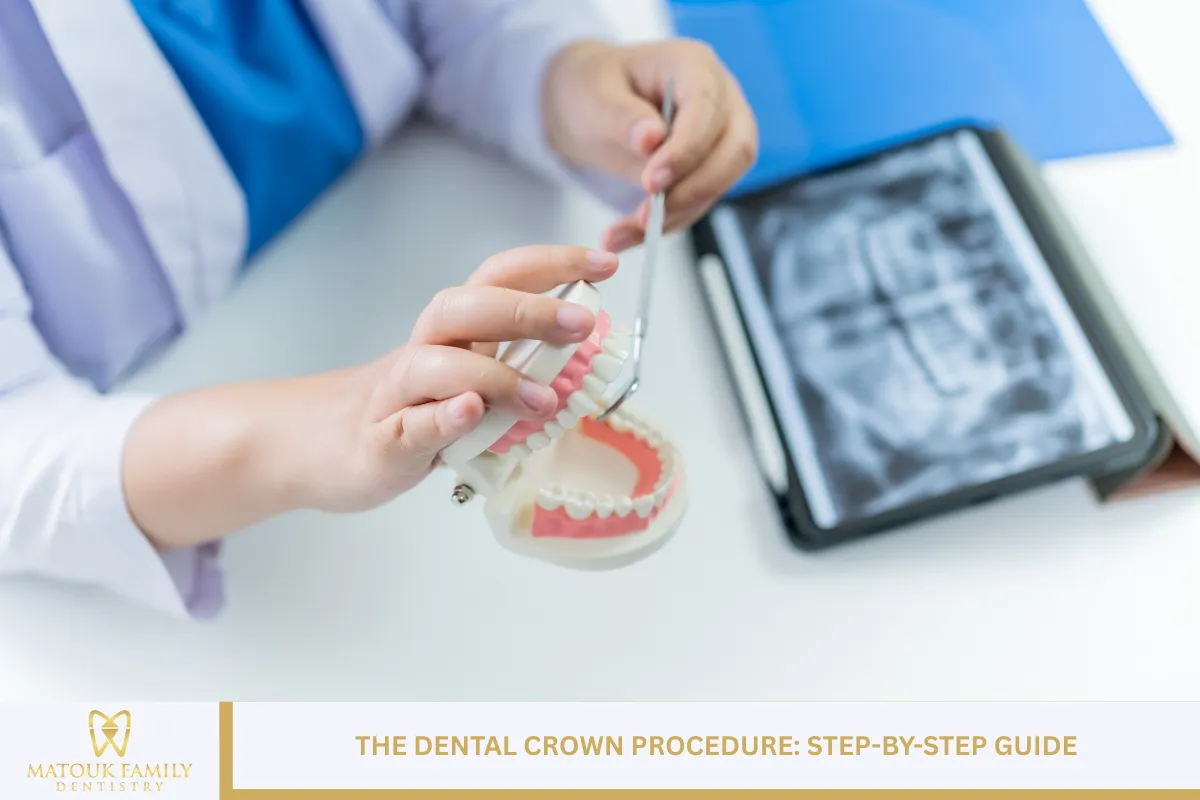
Getting a dental crown is a multi-step process that is typically completed in two visits to the dental clinic. Each step is important for ensuring that the crown fits properly and functions like a natural tooth.
Initial Consultation and Assessment
The first visit typically involves an examination, often accompanied by X-rays, to assess the tooth’s condition. The dentist will examine the teeth for signs of decay, infection, or root and surrounding bone damage.
Tooth Preparation
Once a crown is deemed necessary, the dentist reshapes the tooth by removing a portion of the outer layer. This step is crucial to ensure the crown fits snugly and aligns properly with the surrounding teeth.
Impression or Digital Scan
After the tooth is prepared, an impression or digital scan is taken. This model is used to design a custom crown that matches your bite and blends with your natural teeth.
Temporary Crown Placement
While the permanent crown is being made, usually in a dental lab, a temporary crown is placed to protect the tooth. This crown allows the patient to function normally in the interim.
Permanent Crown Placement
During the second appointment, the temporary crown is removed and the permanent one is cemented in place. The dentist will make adjustments to ensure comfort, proper bite, and a natural appearance.
Average Lifespan and Durability of Dental Crowns
Crowns are designed to last, but their durability depends on several factors, including the material used, the tooth’s location, and proper care and maintenance over time.
Most dental crowns last between 10 to 15 years, but with excellent care, they can remain functional for up to 20 years or more. Metal crowns tend to last longer than porcelain options, but advances in ceramic materials are quickly closing that gap.
Proper oral hygiene, regular dental checkups, and avoiding habits such as chewing ice or using teeth as tools can help extend the life of any dental crown.
Daily Care and Maintenance Tips for Dental Crowns
Caring for a crown is very similar to caring for natural teeth; however, a few extra precautions can help ensure its longevity and prevent future problems.
- Brush your teeth twice daily using a fluoride toothpaste and a soft-bristle toothbrush.
- Floss once a day, paying close attention to the area where the crown meets the gum.
- Avoid hard or sticky foods that could dislodge or crack the crown.
- Use a mouthguard if you grind your teeth at night.
- Maintain regular dental visits for professional cleanings and evaluations.
These simple habits not only help preserve your crown but also support your overall oral health.
Understanding the Costs of Dental Crowns in South Houston
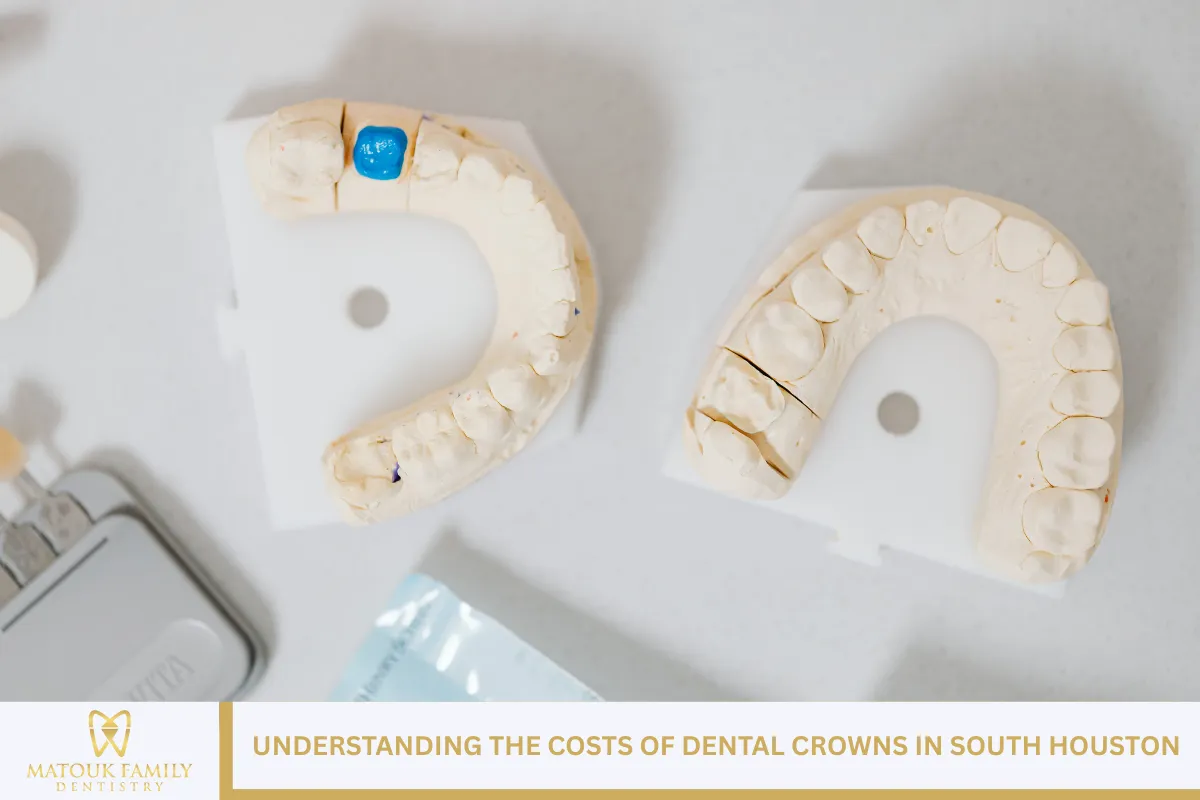
The price of a dental crown varies depending on the materials used, the clinic’s pricing, and whether or not insurance is involved.
Estimated Price Range
In South Houston, dental crown procedures typically cost between $900 and $2,500 per tooth. Porcelain and ceramic options are on the higher end of the scale. At the same time, metal or resin crowns may be more affordable.
Insurance and Payment Options
Many dental insurance plans cover a portion of the cost, especially if the crown is medically necessary rather than purely cosmetic. Patients are encouraged to check with their provider beforehand. Most clinics also offer flexible payment plans to help spread the cost over time.
Risks and Potential Complications
Although crowns are a safe and common treatment, a few issues may arise if care is not taken.
- Sensitivity may occur shortly after placement, especially with hot or cold foods.
- Crown Loosening can happen if the cement weakens or the fit changes.
- Chipping or cracking is more common in porcelain crowns.
- Gum Irritation or Infection may develop if the crown does not fit well or if oral hygiene is neglected.
Should any discomfort or unusual symptoms occur, a prompt visit to the dental clinic is advised to address the issue before it worsens.
Choosing a Reliable Dental Clinic in South Houston
Selecting the right dental provider is just as important as the treatment itself. A good clinic will offer personalized care, clear communication, and a comfortable environment.
Look for a dental clinic that:
- Offers multiple crown material options
- Uses digital scanning for accurate impressions
- Has flexible appointment scheduling
- Provides clear cost estimates and insurance support
Experienced dentists and updated equipment can significantly improve the results and longevity of your dental crown.
Enhancing Dental Wellness with Long-Term Solutions
Tooth damage, decay, or structural problems should never be ignored. Dental crowns offer a reliable way to repair teeth while maintaining a natural appearance and strong function. By choosing this restorative treatment, patients can protect their teeth from further harm and restore confidence in their smile.
In South Houston, dental clinics play a crucial role in maintaining oral health through solutions such as crowns. Knowing what to expect and how to care for a crown ensures that it remains a lasting part of your smile. With regular checkups and at-home care, crowns can give your teeth a second chance at full strength and appearance.
South Houston Dental Clinic – Matouk Family Dentistry
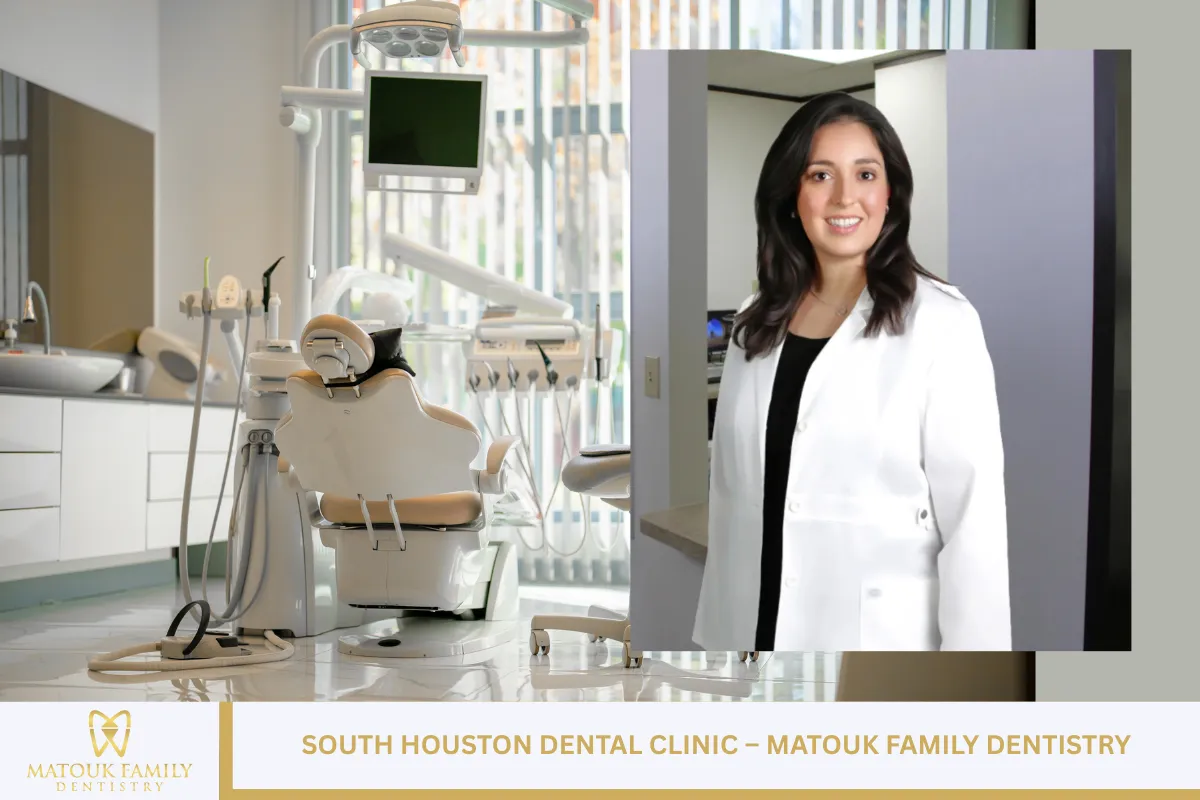
Matouk Family Dentistry offers dependable dental care to patients in South Houston. We offer treatments to repair damaged teeth, including custom dental crowns that restore strength and function. Our goal is to make every visit easy to understand, comfortable, and focused on long-term oral health.
Led by Dr. Christina Matouk, our clinic offers a full range of dental services for individuals and families. Located just off the Gulf Freeway, we’re here for everything from exams and cleanings to restorative procedures like crowns and implant restoration. To schedule an appointment or learn more about our services, call us at (281) 484-3675.
Frequently Asked Questions About Dental Crowns
1. What’s the difference between a dental crown and a dental filling?
A dental crown and a dental filling are both types of dental restoration. Still, they serve different purposes depending on the extent of tooth damage.
- Dental fillings are used to treat minor to moderate cavities. After removing the decayed portion, the area is filled with materials such as composite resin or amalgam to restore the tooth’s shape and function.
- Dental crowns are necessary when a tooth has lost a significant portion of its structure, often after a root canal treatment, large cavity, or fracture. The crown covers the entire tooth like a tooth-shaped cap, protecting it from further damage.
Here’s how they differ in application:
- Extent of damage: Fillings for small decay; crowns for extensive tooth damage.
- Material coverage: Fillings are placed inside the tooth, while crowns wrap around it.
- Longevity: Crowns generally last longer when maintained with proper dental hygiene.
Choosing between the two depends on how much tooth enamel and structural integrity remain.
2. How do ceramic crowns compare to metal crowns and zirconia crowns?
Choosing the right type of dental crown depends on your individual needs, the location of the tooth, and your aesthetic goals. Ceramic, metal, and zirconia crowns are three popular options, each with pros and cons.
Ceramic Crowns
- Best for front teeth due to their natural appearance.
- Mimic natural tooth enamel in color and translucency.
- Less durable under heavy pressure.
Metal Crowns
- Made from gold, nickel, or other alloys.
- Extremely strong and ideal for molars.
- Don’t blend in with natural teeth and may be visible near the gum line.
Zirconia Crowns
- Offer the strength of metal with the aesthetics of ceramic.
- Resistant to chips and fractures.
- It can be monolithic (solid) or layered with porcelain for a more aesthetically pleasing appearance.
In a modern dental practice, zirconia is often recommended for patients seeking both durability and an attractive finish, particularly in areas where both strength and appearance are crucial.
3. What happens during the tooth prep for crown placement?
Tooth prep for crown placement is a critical step in the dental procedure. This process ensures the crown will fit properly, stay in place, and function like a natural tooth. Here’s how dentists prepare a tooth for a crown:
- Examination: The tooth is evaluated for decay or fractures.
- Enamel removal: A small portion of the tooth enamel is shaved down using precise dental tools. This makes space for the crown.
- Structural buildup: If the tooth is too damaged, a buildup may be required to support the crown.
- Impressions: A mold or digital scan is sent to a dental laboratory to create the custom crown.
- Temporary Crown: A temporary crown is placed using dental cement to protect the tooth while the final version is being created.
The procedure is usually done under local anesthesia and may take two visits unless same-day technology is used.
4. Can a dental crown be used after a root canal treatment?
Yes, placing a dental crown after a root canal treatment is not only common but often essential. A root canal removes the infected pulp from inside a tooth, significantly weakening the tooth’s structure. After this dental procedure, the tooth becomes brittle and is more prone to fractures.
Why a Crown Is Needed:
- Protection: Shields the tooth from breaking.
- Functionality: Restores chewing strength and bite.
- Durability: Extends the life of the treated tooth.
Often, a temporary crown is placed immediately after the root canal to protect the tooth. At the same time, the permanent one is being crafted. The final crown may be ceramic, zirconia, or metal, depending on the location and load-bearing needs of the tooth.
Crowns after root canals are especially important for molars, where daily biting forces are strongest. Without one, the tooth could crack or split, possibly requiring extraction and subsequent dental implants.
5. How does a crown work with dental bridges and implants?
Crowns are often used as part of larger dental restoration plans, especially when creating dental bridges or finishing dental implants. Both involve replacing missing teeth, but the roles crowns play in each are slightly different.
With Dental Bridges:
- The teeth on either side of the gap are called abutment teeth.
- These are reshaped and fitted with dental crowns.
- The artificial tooth (pontic) is suspended between the crowns to fill the gap.
With Dental Implants:
- A titanium post is placed in the jawbone.
- Once healed, a crown is attached to the post via an abutment.
- The crown serves as the visible, functional part of the tooth.
In both cases, the crown is essential to restoring the patient’s bite, aesthetics, and comfort. It also supports long-term oral health by preventing gum disease, dental decay, and tooth movement.
Well-fitted crowns, made in a dental laboratory, provide strength, balance, and a natural appearance, thereby completing the treatment successfully.
Read more: South Houston Dental Clinic: What is a Root Canal Treatment?

